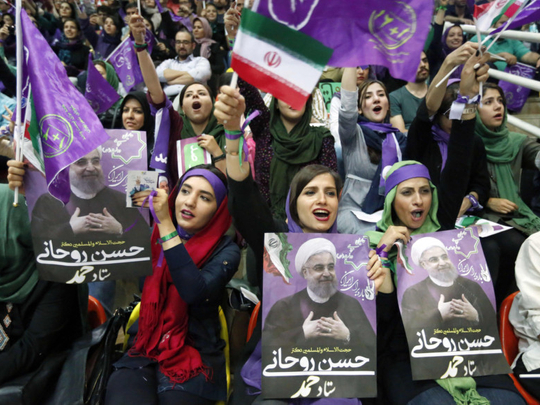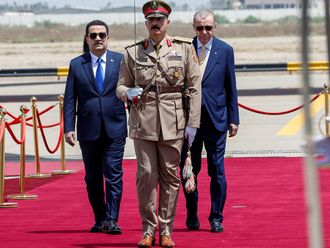
Tehran: Iranians vote in a presidential election on Friday that could decide the country’s direction and who gets a more powerful job that isn’t on the ballot paper: the Islamic republic’s next supreme leader.
Since Ebrahim Raisi, until recently a little-known cleric, entered the race last month talk is rife about whether he is being groomed as a potential successor to Ali Khamenei. The 77-year-old head of state is supposed to be above the political fray, but his perceived support for Raisi has united conservatives and electrified an otherwise routine election campaign.
No Iranian president has lost a bid for a second term in the history of the republic founded by the 1979 Islamic Revolution. Khamenei’s intervention means that although still the opinion poll favourite, Rouhani has come closer to being the first.
“I only follow the supreme leader, and I believe the supreme leader supports Raisi,’’ said Zahra, a 50-year-old housewife dressed in black chador robes, as were the rest of the women among the tens of thousands at a rally in central Tehran on Tuesday. “I am sure he will win.’’
Iran has a complex political system. One part is determined by regular presidential and parliamentary elections and the other is rooted in a deep, opaque state under the control of the supreme leader. It makes what happens on the day Khamenei passes impossible to predict, yet all-important.
Raisi, 56, was hand-picked last year by Khamenei to run one of Iran’s holiest shrines and then pitched onto the front line of the presidential race. That meteoric rise has fuelled speculation over his ambitions, not least because they tick off the attributes a resume would need to contest for the top job.
Khamenei, the only supreme leader since Ayatollah Ruhollah Khomeini, served two terms as president. At the same time, the position has a spiritual significance for Shiites similar to the Pope for Catholics, requiring clerical seniority.
Yet the process is also hard to predict. Not only will the new leader be “identified” by more than 80 elected religious figures at the Assembly of Experts, but the demise of Khamenei could itself bring about political change.
Until the 2015 nuclear deal, in which Iran agreed to roll back its nuclear fuel programme and a group of world powers lifted economic sanctions, any real debate over the country’s future was academic, but options have opened.
“In many ways this is the most important election they have had in a long time,’’ said Anoush Ehteshami, professor of international relations at the UK’s Durham University. “Iran is now on the cusp of some very important decisions about the future of the country.’’
To some outside Iran, Friday’s presidential vote appears to be of little consequence. Both candidates say they would keep to the nuclear deal Rouhani negotiated, and there is little reason to believe Iran would change its interventionist policies in Syria or other parts of the Middle East.
At the same time, Rouhani’s promise to open Iran to foreign investment has been limited by the lingering threat of US punishment of western banks and companies tempted to take the plunge. Raisi now threatens to shut up shop again. Iran’s interventions in Iraq, Syria, Yemen and elsewhere in the region are unlikely to change either. And whatever liberalisation Rouhani might want in social terms, he has delivered only at the margins.
Yet that assessment is too simplistic, according to Iranian economist Sayeed Leylaz. “We realise now we have two strategic paths, two directions Iran can take,” he said at the headquarters of the commercial vehicle factory just outside Tehran where he works.
"With much of the Middle East in flames, few Iranians want to see the regime collapse in any Arab Spring-style uprising — but they do want to see Iran open up to the West and integrate into the rest of the global economy. That means pushing back against the revolutionary strictures of conservatives in the regime “centimetre by centimetre’’ until their minds are changed, he said.
The alternative path leads backwards, toward international isolation and maintaining the dominant economic positions of the state, the Iranian Revolutionary Guard Corps and religious charities of the kind Raisi heads in the holy city of Mashhad.
The danger with this course is that Iran follows the former Soviet Union to collapse, as stagnant productivity, inefficiency and corruption eventually strangle the economy, said Leylaz. Then the choice after Khamenei is whether to go down a Russian or Chinese route to reform and plug the economy into the global grid, he said.
“The question is whether we will get a Vladimir Putin or a Deng Xiaoping,’’ said Leylaz.
The two Irans fighting for control in Friday’s election were on full display at rallies in Tehran this week. In a hall filled mostly with stylish young women, 16-year-old Kimia Kari was worried Raisi would change the country for the worse. Rouhani has presented himself as the pro-women candidate, calling for their economic empowerment.
“We would be in conflict again with other countries and I’m afraid they would forbid us to use the internet,’’ she said. Twitter, Facebook, YouTube and many other sites are already banned in Iran. “Iranians won’t vote for Rouhani, but against Raisi,’’ said her father, Mohammad Kari, 38.
At night, bands and singers play at Rouhani’s electoral offices, turning into impromptu parties that spill onto the pavements. Concerts and the theatre have experienced a revival since Rouhani’s election four years ago, especially in Tehran, where the symphony orchestra was given money and a new conductor after years of neglect.
“We feel the changes in terms of culture, of party life,’’ said Armin Gholizadeh, a 25-year-old musician who plays the Daf, an Iranian drum. He was drumming up votes for Rouhani, wearing one of the campaign team’s Tommy Hilfiger-branded purple shirts, despite seeing the president as a conservative in reformist guise. “We don’t want to go backward.’’
Across town at the Raisi rally, there was no music. But women gathered toward the back of a packed mosque the size of several soccer fields were just as fervent about the election’s importance to them.
“We have to manage our country again according Islam’s rules, not Western ones,’’ said Narges Sadat Zaberani, a 45-year-old mother of two. Rouhani, she said, “only dresses like a cleric.’’
In the end, however, it’s the supreme leader who will set boundaries on both political and economic reform. Khamenei has attacked Rouhani’s government for failing to boost living standards, even as it stabilised an economy in free fall. That suggests the supreme leader would, at the least, like to see Rouhani’s electoral mandate weakened, making it even harder to drive through changes to Iran’s “resistance economy’’ and revolutionary mission.
Raisi has taken a considerable gamble if his ambition is to eventually replace Khamenei, as a thorough defeat in a presidential election would undermine the legitimacy that a supreme leader needs, according to Ali Ansari, professor of Iranian history at St. Andrew’s University in Scotland.
Still, the sudden rise of Raisi to high-profile religious and political roles in the space of a year shows what Friday’s vote is really about, he said.
“I do think this election is about the next supreme leader, or it doesn’t make sense,’’ said Ansari.
“With Raisi to succeed him, Khamenei can die confident. People say he is worried for his legacy and he is; the legacy he is concerned about is as protector of the revolution.’’











